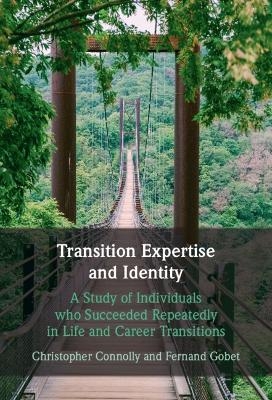
Transition Expertise and Identity
Cambridge University Press (Verlag)
978-1-009-10017-5 (ISBN)
Through a systematic review of relevant literature and an analysis of in-depth interviews with key expert performers, this book examines the nature of expertise that enables individuals to make repeated successful transitions over the course of their career. Focusing on business, sports, and music, it examines the roles of motivation, cognitive flexibility, personal intelligence, generative thinking, and contextual intelligence in this process. It further shows how identity changes and adapts during a career transition and how self concept evolves over the course of a career. This book has wide appeal for academics in psychology, sports, music, and business, as well as coaches, mentors, talent management, and training organisations across these domains.
Christopher Connolly is Director of SyCon and Transition Expertise. He pioneered applied sport psychology by working with Olympic gold medal winners, professional sports people, and international athletes on both sides of the Atlantic. He has also worked with musicians and conservatories throughout Europe. He is the author of five books on human performance and is widely recognized in business and sport for the application of his expertise in team development and elite performance. Fernand Gobet is Professorial Research Fellow at the London School of Economics and Political Science. A world leader in the field of expertise and talent, he has also carried out influential research on the acquisition of language and computational modelling. He has authored over 400 publications, including Understanding Expertise (2016) and The Psychology of Chess (2018).
Preface: is there such a thing as transition expertise?; Introduction; 1. Introduction: career transitions in expert performers; Part I. Transitions: 2. Career stage transitions: a work life cycle review; 3. The expert transition cycle: the process of change in a transition; 4. Intelligence, cognition, and expertise: as they inform transition expertise; Part II. Transition Expertise: 5. Cognitive flexibility: mental adaptation and evolution; 6. Generative intelligence: the intelligence of change; 7. Personal intelligences: awareness of self and others in transitions; 8. Contextual intelligence: utilizing the environment in transitions; Part III. Motivation: 9. Motivation: the intrinsic organization of choice; 10. Purpose: motivation informing meaning; Part IV. The Project of the Self: 11. Identity: its adaption during the expert transition cycle; 12. Self concept: its evolution during career stage transitions; Conclusion; 13. Conclusion: findings and future opportunities; Appendices; Appendix 1: methodology; Appendix 2: Non-transitions.
| Erscheinungsdatum | 25.05.2024 |
|---|---|
| Zusatzinfo | Worked examples or Exercises |
| Verlagsort | Cambridge |
| Sprache | englisch |
| Maße | 152 x 229 mm |
| Gewicht | 803 g |
| Themenwelt | Sachbuch/Ratgeber ► Sport |
| Geisteswissenschaften ► Psychologie ► Allgemeine Psychologie | |
| Geisteswissenschaften ► Psychologie ► Arbeits- und Organisationspsychologie | |
| Geisteswissenschaften ► Psychologie ► Verhaltenstherapie | |
| ISBN-10 | 1-009-10017-3 / 1009100173 |
| ISBN-13 | 978-1-009-10017-5 / 9781009100175 |
| Zustand | Neuware |
| Informationen gemäß Produktsicherheitsverordnung (GPSR) | |
| Haben Sie eine Frage zum Produkt? |
aus dem Bereich


